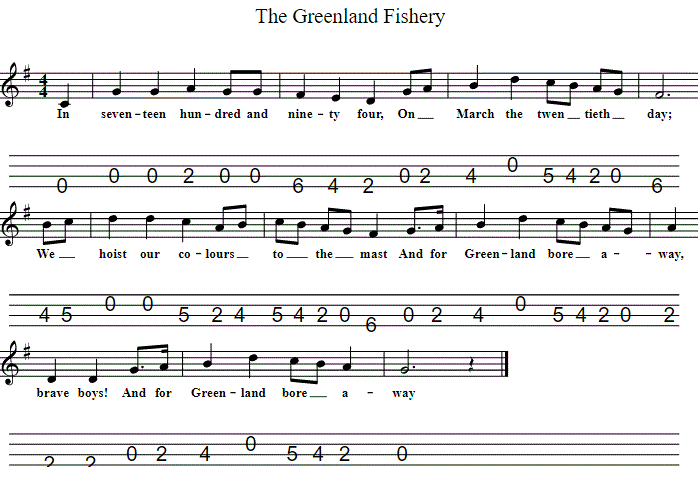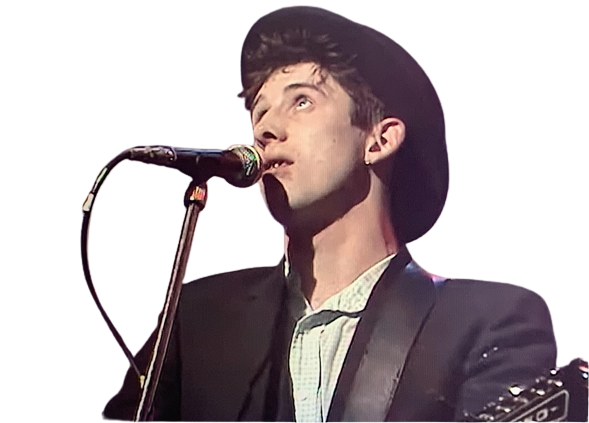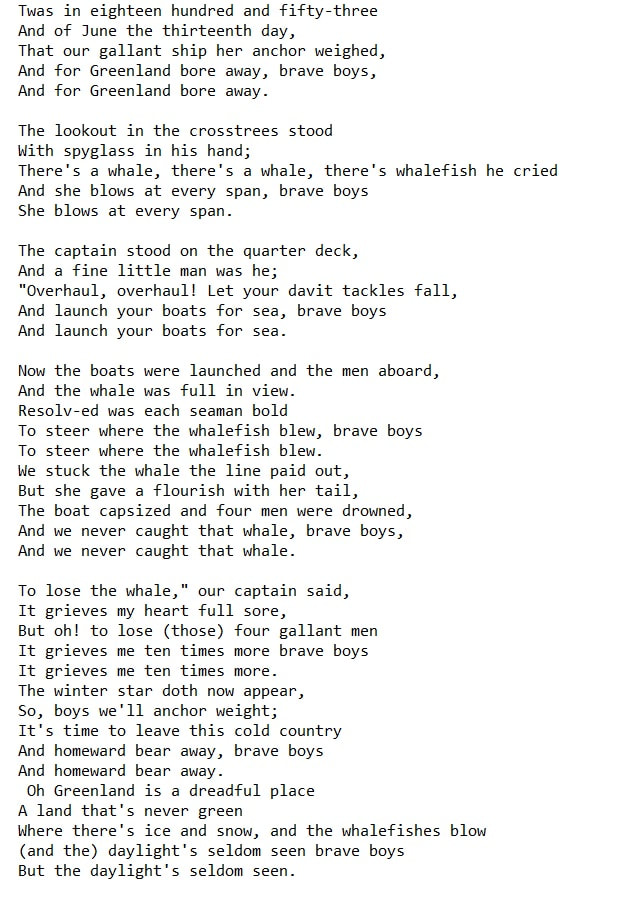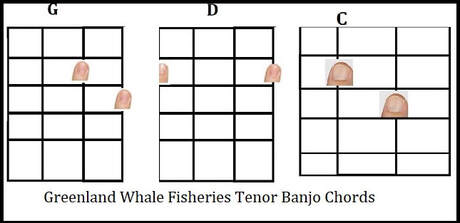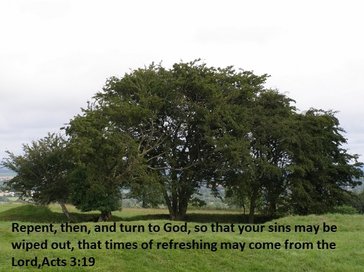Greenland Whale Fisheries lyrics and Guitar chords
Greenland Whale Fisheries is a Traditional sea shanty song, recorded by The Clancys, The Dubliners, and by The Pogues.The 5 string banjo chords are here plus the four string tenor banjo chords in G Major. The sheet music is suitable for the flute.The guitar chords are in chordpro. Depending who sings this song the lyrics get changed. The video is of The Pogues. I have also included a version of the chords as used by The Pogues which is in the key of G Major. Greenland whale fisheries tenor guitar tab in CGDA added.
Greenland Whale Fisheries Words And Chords In The Key Of G
[G]Twas in eighteen hundred and[D] fifty-[G]three
And of[C] June the[G] thirteenth[D] day,
That our[G] gallant ship her[C] anchor weighed,
And for[G] Greenland[D] bore a[G]way, brave boys,
And for Greenland[D] bore a[G]way.
The lookout in the crosstrees stood
With spyglass in his hand;
There's a whale, there's a whale, there's whalefish he cried
And she blows at every span, brave boys
She blows at every span.
The captain stood on the quarter deck,
And a fine little man was he;
"Overhaul, overhaul! Let your davit tackles fall,
And launch your boats for sea, brave boys
And launch your boats for sea.
Now the boats were launched and the men aboard,
And the whale was full in view.
Resolv-ed was each seaman bold
To steer where the whalefish blew, brave boys
To steer where the whalefish blew.
We stuck the whale the line paid out,
But she gave a flourish with her tail,
The boat capsized and four men were drowned,
And we never caught that whale, brave boys,
And we never caught that whale.
To lose the whale," our captain said,
It grieves my heart full sore,
But oh! to lose (those) four gallant men
It grieves me ten times more brave boys
It grieves me ten times more.
The winter star doth now appear,
So, boys we'll anchor weight;
It's time to leave this cold country
And homeward bear away, brave boys
And homeward bear away.
Oh Greenland is a dreadful place
A land that's never green
Where there's ice and snow, and the whalefishes blow
(and the) daylight's seldom seen brave boys
But the daylight's seldom seen.
Greenland Whale Fisheries Sheet Music Notes
[G]Twas in eighteen hundred and[D] fifty-[G]three
And of[C] June the[G] thirteenth[D] day,
That our[G] gallant ship her[C] anchor weighed,
And for[G] Greenland[D] bore a[G]way, brave boys,
And for Greenland[D] bore a[G]way.
The lookout in the crosstrees stood
With spyglass in his hand;
There's a whale, there's a whale, there's whalefish he cried
And she blows at every span, brave boys
She blows at every span.
The captain stood on the quarter deck,
And a fine little man was he;
"Overhaul, overhaul! Let your davit tackles fall,
And launch your boats for sea, brave boys
And launch your boats for sea.
Now the boats were launched and the men aboard,
And the whale was full in view.
Resolv-ed was each seaman bold
To steer where the whalefish blew, brave boys
To steer where the whalefish blew.
We stuck the whale the line paid out,
But she gave a flourish with her tail,
The boat capsized and four men were drowned,
And we never caught that whale, brave boys,
And we never caught that whale.
To lose the whale," our captain said,
It grieves my heart full sore,
But oh! to lose (those) four gallant men
It grieves me ten times more brave boys
It grieves me ten times more.
The winter star doth now appear,
So, boys we'll anchor weight;
It's time to leave this cold country
And homeward bear away, brave boys
And homeward bear away.
Oh Greenland is a dreadful place
A land that's never green
Where there's ice and snow, and the whalefishes blow
(and the) daylight's seldom seen brave boys
But the daylight's seldom seen.
Greenland Whale Fisheries Sheet Music Notes
Greenland whale fisheries tenor guitar tab in CGDA
The Greenland Whale Fisheries song is a traditional sea shanty that originated in the 19th century. The song tells the story of a whaling voyage to the Arctic waters of Greenland, a dangerous and treacherous journey that was undertaken by many sailors during this time. The lyrics of the song depict the harsh realities of life on a whaling ship, the struggles and dangers faced by the crew, and the ultimate fate of the majestic whales.
The origins of the Greenland Whale Fisheries song can be traced back to the early 1800s, when the whaling industry was at its peak. Whaling was a major economic activity in countries like England, Scotland, and America, with ships venturing to the Arctic waters to hunt for the valuable whale oil. The song was most likely composed by sailors who worked on these ships, as a way to pass the time and to share their experiences with others.
The lyrics of the Greenland Whale Fisheries song are a powerful and poignant reflection of the harsh and dangerous nature of whaling. The first verse describes the departure of the ship from England, with the sailors bidding farewell to their loved ones and setting off on a perilous journey. The second verse talks about the treacherous weather conditions and the constant fear of the ship being crushed by icebergs. This speaks to the real dangers faced by whaling ships in the Arctic, where the weather was unpredictable and the sea was often frozen.
The third verse of the song paints a vivid picture of the actual hunting of the whales. The sailors are portrayed as brave and skilled hunters, who risk their lives to capture these magnificent creatures. The line “and when the line gets full and the whale is clear/ and the whale is clear, boys, we give a loud cheer” highlights the excitement and sense of accomplishment that comes with successfully capturing a whale. However, the next verse brings to light the gruesome reality of the hunt, with the sailors “cutting and slashing, and ripping and tearing” the whale’s flesh. This verse serves as a reminder that despite the bravery and skill of the sailors, whaling was a brutal and violent activity.
The final verse of the song is perhaps the most haunting, as it describes the fate of the whales. The line “we’ll tow them alongside and cut them in two/ and we’ll sing and we’ll dance as the whaleboats come through” depicts the callous attitude towards the slaughter of these magnificent creatures. The sailors see the whales as nothing more than a source of profit, and their deaths are celebrated rather than mourned. This verse serves as a commentary on the greed and disregard for nature that was prevalent in the whaling industry at the time.
The Greenland Whale Fisheries song also sheds light on the lives of the sailors who worked on these whaling ships. Life on a whaling ship was tough and dangerous, with long hours of hard labor and the constant threat of death. This is reflected in the lyrics of the song, with references to the sailors being “half starved” and “half drowned”. The line “we’re the poor little lambs who have lost our way home” speaks to the isolation and loneliness experienced by these sailors, who were often away from their families for months on end.
Despite the dangers and hardships, the Greenland Whale Fisheries song also captures the camaraderie and sense of community among the sailors. The chorus of the song, “We’ll roll the old chariot along/ We’ll roll the old chariot along/ We’ll roll the old chariot along/ And we’ll all hang on behind”, is a call to work together and support each other in the face of adversity. This sense of solidarity was crucial for survival on the whaling ships, where the crew relied on each other for their safety and well-being.
The Greenland Whale Fisheries song has stood the test of time and remains a popular sea shanty to this day. It has been covered by numerous artists and has been included in various collections of traditional folk songs. This is a testament to the enduring appeal and significance of the song, which serves as a reminder of the dangers and brutality of the whaling industry and the sacrifices made by the sailors who worked in it.
In conclusion, the Greenland Whale Fisheries song is a powerful and evocative portrayal of the whaling industry in the 19th century. Its lyrics provide a glimpse into the harsh realities of life on a whaling ship, the dangers faced by the sailors, and the fate of the majestic whales. The song serves as a reminder of the impact of human activities on nature and the need for responsible and sustainable practices. It also honors the bravery and resilience of the sailors who embarked on these treacherous voyages, and their contribution to the history of seafaring.
The origins of the Greenland Whale Fisheries song can be traced back to the early 1800s, when the whaling industry was at its peak. Whaling was a major economic activity in countries like England, Scotland, and America, with ships venturing to the Arctic waters to hunt for the valuable whale oil. The song was most likely composed by sailors who worked on these ships, as a way to pass the time and to share their experiences with others.
The lyrics of the Greenland Whale Fisheries song are a powerful and poignant reflection of the harsh and dangerous nature of whaling. The first verse describes the departure of the ship from England, with the sailors bidding farewell to their loved ones and setting off on a perilous journey. The second verse talks about the treacherous weather conditions and the constant fear of the ship being crushed by icebergs. This speaks to the real dangers faced by whaling ships in the Arctic, where the weather was unpredictable and the sea was often frozen.
The third verse of the song paints a vivid picture of the actual hunting of the whales. The sailors are portrayed as brave and skilled hunters, who risk their lives to capture these magnificent creatures. The line “and when the line gets full and the whale is clear/ and the whale is clear, boys, we give a loud cheer” highlights the excitement and sense of accomplishment that comes with successfully capturing a whale. However, the next verse brings to light the gruesome reality of the hunt, with the sailors “cutting and slashing, and ripping and tearing” the whale’s flesh. This verse serves as a reminder that despite the bravery and skill of the sailors, whaling was a brutal and violent activity.
The final verse of the song is perhaps the most haunting, as it describes the fate of the whales. The line “we’ll tow them alongside and cut them in two/ and we’ll sing and we’ll dance as the whaleboats come through” depicts the callous attitude towards the slaughter of these magnificent creatures. The sailors see the whales as nothing more than a source of profit, and their deaths are celebrated rather than mourned. This verse serves as a commentary on the greed and disregard for nature that was prevalent in the whaling industry at the time.
The Greenland Whale Fisheries song also sheds light on the lives of the sailors who worked on these whaling ships. Life on a whaling ship was tough and dangerous, with long hours of hard labor and the constant threat of death. This is reflected in the lyrics of the song, with references to the sailors being “half starved” and “half drowned”. The line “we’re the poor little lambs who have lost our way home” speaks to the isolation and loneliness experienced by these sailors, who were often away from their families for months on end.
Despite the dangers and hardships, the Greenland Whale Fisheries song also captures the camaraderie and sense of community among the sailors. The chorus of the song, “We’ll roll the old chariot along/ We’ll roll the old chariot along/ We’ll roll the old chariot along/ And we’ll all hang on behind”, is a call to work together and support each other in the face of adversity. This sense of solidarity was crucial for survival on the whaling ships, where the crew relied on each other for their safety and well-being.
The Greenland Whale Fisheries song has stood the test of time and remains a popular sea shanty to this day. It has been covered by numerous artists and has been included in various collections of traditional folk songs. This is a testament to the enduring appeal and significance of the song, which serves as a reminder of the dangers and brutality of the whaling industry and the sacrifices made by the sailors who worked in it.
In conclusion, the Greenland Whale Fisheries song is a powerful and evocative portrayal of the whaling industry in the 19th century. Its lyrics provide a glimpse into the harsh realities of life on a whaling ship, the dangers faced by the sailors, and the fate of the majestic whales. The song serves as a reminder of the impact of human activities on nature and the need for responsible and sustainable practices. It also honors the bravery and resilience of the sailors who embarked on these treacherous voyages, and their contribution to the history of seafaring.
Here's the guitar chords as played by The Pogues.
The intro, G C G C
in [G]eighteen hundred and[D] forty six
On [G]March the Eighteenth[D] day,
We [G]hoisted the colours to the [C]top of the mast
[G]And for greenland [D]sailed a[G]way brave boys
And for Greenland [D]sailed a[G]way
The intro, G C G C
in [G]eighteen hundred and[D] forty six
On [G]March the Eighteenth[D] day,
We [G]hoisted the colours to the [C]top of the mast
[G]And for greenland [D]sailed a[G]way brave boys
And for Greenland [D]sailed a[G]way
